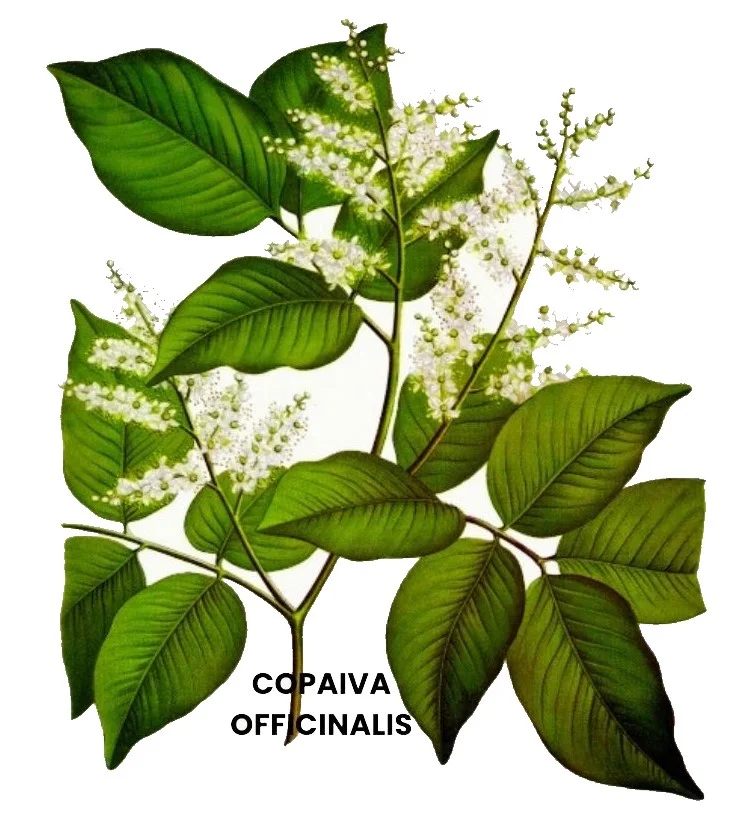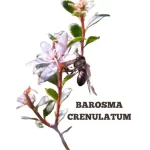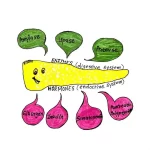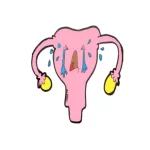Copaiva Officinalis, commonly known as Balsam of Copaiva, is a potent remedy known for its action on mucous membranes, particularly in the urinary tract, respiratory organs, and skin.
It is indicated for conditions such as colds, catarrhs, and various urinary and respiratory issues.
Copaiva produces a distinct nettle-rash on the skin and is effective in addressing symptoms related to inflammation and irritation.

Table of Contents
ToggleSOURCE INFORMATION
Scientific Classification
- Kingdom: Plantae
- Order: Fabales
- Family: Fabaceae
- Genus: Copaifera
- Species: Copaifera officinalis
Origin
Copaiva Officinalis originates from South America, particularly the Amazon rainforest region, where it has been used traditionally for its medicinal properties by indigenous peoples.
It is extracted from the resin of Copaifera trees.
Historical Facts
- The indigenous people of South America have a long history of using Copaiva resin for various medicinal purposes, including treating respiratory and urinary tract issues.
- Copaiva resin has been traditionally used as a topical remedy for skin conditions and wounds due to its antimicrobial and anti-inflammatory properties.
DRUG PATHOGENESIS
- Copaiva acts powerfully on mucous membranes, producing marked effects on the urinary tract, respiratory system, and skin.
- It is indicated for conditions such as colds, catarrhs, and urinary issues, characterized by symptoms of inflammation, irritation, and discomfort.
- Copaiva produces a distinctive nettle-rash on the skin, indicating its efficacy in addressing skin conditions with inflammatory responses.
KEY CHARACTERISTICS
- Effective for colds, catarrhs, and various urinary and respiratory issues.
- Produces a well-marked nettle-rash on the skin.
- Indicated for symptoms such as excessive sensitiveness, headache, burning pressure in the urinary tract, and profuse expectoration.
- Symptoms worsen with motion and are often accompanied by sensitivity to sharp sounds.
PARTICULAR ORGAN SYMPTOMS
HEAD
- Excessive sensitivity, particularly in the occiput, accompanied by dull frontal headaches that may shift to the occiput.
- Headaches worsened by motion and sharp sounds.
NOSE
- Rawness and soreness of nostrils, dryness of posterior nares.
- Profuse, thick, fetid nasal discharge running down the throat, especially at night.
STOMACH
- Gastric troubles, particularly during menstruation or following urticaria.
- Symptoms include gas, flatulence, and difficult passage of stool with pain.
URINARY
- Burning pressure and painful micturition.
- Retention with pain in the bladder, anus, and rectum.
- Catarrh of the bladder, dysuria, constant desire to urinate.
- Urine smelling of violets.
RECTUM
- Mucous colitis, characterized by stools covered with mucus.
- Colic, chilliness, burning, and itching of the anus caused by piles.
RESPIRATORY
- Cough with profuse, gray, purulent expectoration.
- Tickling sensation in the larynx, trachea, and bronchi.
- Bronchial catarrh with profuse greenish, offensive discharge.
MODALITIES
Symptoms worsen with motion, and there is heightened sensitivity to sharp sounds.
RELATIONSHIP
- Antidotes: Belladonna, Mercury.
- Compare with remedies such as Santalum, Cannab, Cantharis, Barosma, Cubeba, Apis, Vespa, Erigeron, Senecio, and Sepia.
DOSE
- Administer Copaiva Officinalis in the first to third attenuations.
Frequently Asked Questions
Q: What are the main indications for using Copaiva Officinalis?
A: Copaiva Officinalis is primarily indicated for conditions such as colds, catarrhs, urinary tract issues, and skin conditions characterized by inflammation and irritation.
Q: How does Copaiva Officinalis affect the urinary tract?
A: Copaiva produces a burning pressure in the urinary tract, painful micturition, retention, and a constant desire to urinate. Urine may have a violet odor.
Q: Can Copaiva Officinalis be used for respiratory issues?
A: Yes, Copaiva is effective for addressing respiratory conditions such as cough with profuse expectoration, bronchial catarrh, and tickling in the larynx, trachea, and bronchi.
Q: What are the modalities associated with Copaiva Officinalis?
A: Symptoms worsen with motion, and there is heightened sensitivity to sharp sounds.
Q: Is Copaiva Officinalis safe for use in children and pregnant women?
A: It is advisable to consult a healthcare professional before using Copaiva Officinalis, especially in children, pregnant women, or individuals with underlying health conditions.
Meaning of Difficult Words
- Mucous Membranes: The moist tissues that line various cavities and structures in the body, such as the respiratory tract, gastrointestinal tract, and urinary tract.These membranes produce mucus, which helps protect and lubricate the tissues.
- Catarrh: Inflammation of the mucous membranes, typically resulting in excessive mucus production and symptoms such as congestion, coughing, and nasal discharge.
- Nettle-Rash: Also known as urticaria, it is a skin condition characterized by raised, itchy welts or hives that appear suddenly and often disappear within a few hours. It can be triggered by various factors, including allergic reactions, infections, and stress.
- Antimicrobial: Having the ability to inhibit the growth of microorganisms or to kill them outright. Antimicrobial agents can be effective against bacteria, viruses, fungi, and other pathogens.
- Anti-inflammatory: Having the ability to reduce inflammation, which is the body’s response to injury or infection. Anti-inflammatory agents help alleviate symptoms such as pain, swelling, and redness.
- Antiseptic: A substance that prevents the growth of disease-causing microorganisms or kills them. Antiseptics are often used to disinfect wounds, skin, and mucous membranes to prevent infection.
- Expectoration: The act of coughing up and spitting out phlegm or mucus from the respiratory tract. Expectoration is a natural defense mechanism to clear the airways of excess secretions.
- Mucous Colitis: Also known as irritable bowel syndrome (IBS), it is a common gastrointestinal disorder characterized by abdominal pain, bloating, diarrhea, and constipation. Mucous colitis refers to the presence of excessive mucus in the stool, which is a common symptom of IBS.
- Bronchial Catarrh: Inflammation of the mucous membranes lining the bronchial tubes, which are the airways that carry air to and from the lungs. Bronchial catarrh can result in symptoms such as coughing, wheezing, and difficulty breathing.
- Erysipelatous Inflammation: A type of skin inflammation caused by a bacterial infection, typically Streptococcus bacteria. Erysipelatous inflammation is characterized by redness, swelling, and warmth of the affected skin, often with well-defined borders.
- Circumscribed: Limited to a specific area or region; localized. In the context of skin symptoms, circumscribed lenticular patches refer to small, round areas of skin with distinct borders and a raised or flat surface.
- Urticaria: Another term for hives or nettle-rash, urticaria is a skin condition characterized by the sudden appearance of itchy welts or hives on the skin. It can be triggered by various factors, including allergic reactions, infections, and stress.
- Bullous Eruptions: Skin eruptions characterized by the formation of fluid-filled blisters or bullae on the skin. Bullous eruptions can result from various causes, including infections, allergic reactions, and autoimmune disorders.













Leave a Reply